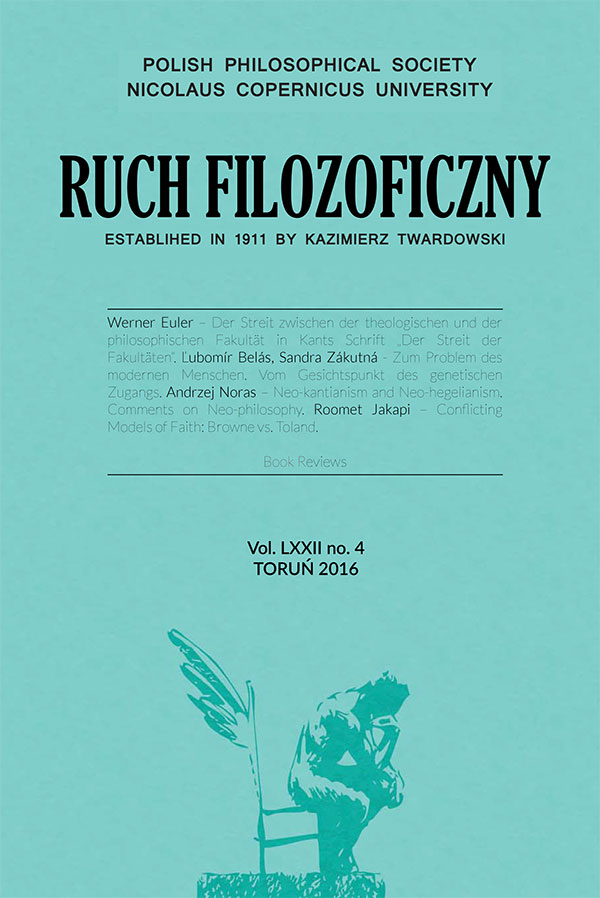Der Streit zwischen der theologischen und der philosophischen Fakultät in Kants Schrift „Der Streit der Fakultäten“
DOI:
https://doi.org/10.12775/RF.2016.036Słowa kluczowe
idea of university, conflict of the faculties, philosophy, theology, religion, political power, stateAbstrakt
The Contest of Theological and Philosophical Faculties
in “The Contest of Faculties” by Immanuel Kant
Kant’s mature work on the conflict of the faculties includes a theory of the basic establishment of philosophy as an institution embedded in the hierarchical structure of the four faculties in university and touched by the historical conditions of Prussian cultural policy at the end of the 18th century. It involves substantially two intentions: 1st to redefine its ranking within the system of the faculties, changing the position from the lowest to the highest level; 2nd to defend in the name of all faculties the autonomy and the rights of university as a whole unity in relation to the political demands of the Prussian state, because the political autonomy of the university was held to be the precondition for the guaranty of independence of science. In both cases philosophy enters into a struggle with the clerical authority of theology on the one hand and political administration on the other. A central topic of the conflict was the meaning and the role of religion within academic and social life. On the background of these two lines of arguments it will be our tasks in this article 1st to clarify the relation between philosophy and theology concerning moral religion, 2nd to examine the practical relation between the university under the leadership of philosophy and the state as far as the political power should be enlightened about the true principles of government by philosophical reason.
Bibliografia
Arnoldt, Emil, „Beiträge zu der Material der Geschichte von Kants Leben und Schriftstellertätigkeit in bezug auf seine ‚Religionslehre‘ und sein Konflikt mit der preussischen Regierung“, in: Altpreussische Monatsschrift, 34.5/6 (1894), 35.1/2 (1895) (auch als Buch unter gleichem Titel, Königsberg 1898; außerdem in: Emil Arnoldt, Gesammelte Schriften, Vol. 4, Berlin 1909).
Bödeker, Hans Erich, „Von der ‚Magd der Theologie‘ zur ‚Leitwissenschaft‘. Vorüberlegungen zu einer Geschichte der Philosophie des 18. Jahrhunderts“. In: Das achtzehnte Jahrhundert, Bd. 14 (1990), H. 1, 19–57.
Borowski, Ludwig Ernst, „Darstellung des Lebens und Charakters Immanuel Kants“, Königsberg 1804, Beilage „IV. Kants Zensurleiden“, in Felix Gross (Hg.): Immanuel Kant. Sein Leben in Darstellungen von Zeitgenossen. Die Bibliographien von L. E. Borowski, R. B. Jachmann und E. A. Ch. Wasianski. Mit einer Einleitung von Rudolf Malter. Darmstadt 1993.
Brandt, Reinhard: Zum „Streit der Fakultäten“. In: R. Brandt / W. Stark (Hrsg.), Neue Autographen und Dokumente zu Kants Leben, Schriften und Vorlesungen. Hamburg 1987 (Kant-Forschungen Bd. 1), 31–78.
Brandt, Reinhard / Euler, Werner (Hg.), Studien zur Entwicklung preußischer Universitäten. Wiesbaden 1999 (Reihe ‚Wolfenbütteler Forschungen’ Bd. 88).
Brandt, Reinhard: Universität zwischen Selbst- und Fremdbestimmung. Kants ‚Streit der Fakultäten‘. Mit einem Anhang zu Heideggers ‚Rektoratsrede‘. Berlin 2003.
Dilthey, Wilhelm, „Der Streit Kants mit der Zensur über das Recht freier Religionsforschung“, in: Archiv für Geschichte der Philosophie 3 (1890), S. 418–450 (wiederabgedruckt in Gesammelte Schriften, Vol. 4, Stuttgart,
Ausgabe, 1959, S. 285–309).
Fromm, Emil, „Immanuel Kant und die preussische Censur, nebst kleinen Beiträgen zur Lebensgeschichte Kants“, Hamburg und Leipzig 1894.
Fromm, Emil, „Zur Vorgeschichte der Königlichen Kabinetsordre an Kant vom 1. Oktober 1794“, Kant-Studien 3 (1899), 142–147.
Gerhardt, Volker (Hrsg.): Kant im Streit der Fakultäten. Berlin 2005.
Losurdo, Domenico: Autocensura e compromesso nel pensiero politico di Kant. Napoli 2007.
Stiening, Gideon, Die „Freiheit der gelehrten Feder“ und der „Strich des Censors“. Immanuel Kant und die Universitätszensur. In: Brandt, R. / Euler, W. (Hrsg.), Studien zur Entwicklung preußischer Universitäten (1999), 163–201.
Stiening, Gideon, Kants Begriff des öffentlichen Amtes, oder „Staatsverwaltung“ zwischen Aufklärung und Rechtsstaatlichkeit. In: Jahrbuch für europäische Verwaltungsgeschichte 19: Räte und Beamte in der Frühen Neuzeit. Lehren und Schriften. Baden-Baden 2007, 141–169.
Pobrania
Opublikowane
Jak cytować
Numer
Dział
Statystyki
Liczba wyświetleń i pobrań: 1229
Liczba cytowań: 0



